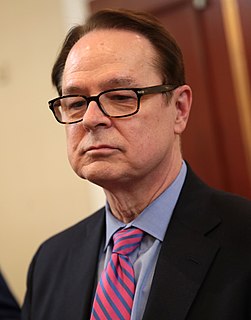A Quote by William Jennings Bryan
The money problem facing the country from 1789 to 1896 existed because Congress never exercised is authority to "coin money or regulate the value thereof" - but rather delegated that authority, sometimes by charter and sometimes by default, to the banking system. This despite the provision in the Constitution that charged Congress with the power to 'coin money, regulate the value thereof, and of foreign Coin, and fix the Standards of weight and Measures.'
Related Quotes
The phase of the usury system which we are trying to analyze is more or less Patterson's perception that the Bank of England could have benefit of all the interest on all the money that it creates out of nothing. ... Now the American citizen can, of course, appeal to his constitution, which states that Congress shall have power to coin money or regulate the value thereof and of foreign coin. Such appeal is perhaps quixotic.
The available supply of gold and silver being wholly inadequate to permit the issuance of coins of intrinsic value or paper currency convertible into coin of intrinsic value or paper currency convertible into coin in the volume required to serve the needs of the People, some other basis for the issue of currency must be developed, and some means other than that of convertibility into coin must be developed to prevent undue fluctuation in the value of paper currency or any other substitute for money intrinsic value that may come into use.
The real reason to abolish departments like Energy and Education is not to promote efficiency, nor even to save taxpayers’ money. It is that many agencies perform functions that are not Federal responsibility. The founders delegated to the Government only strictly defined authority in Article I, Section 8, of the Constitution. Search the entire Constitution, and you will find no authorization for Congress to subsidize the arts, finance and regulate education or invest tax revenues in energy research.
In explaining the Constitution, James Madison, the acknowledged father of the Constitution, wrote in Federalist Paper 45: 'The powers delegated by the proposed Constitution to the Federal government are few and defined. Those which are to remain in the State governments are numerous and indefinite. The former will be exercised principally on external objects, as war, peach, negotiation, and foreign commerce.' Has the Constitution been amended to permit Congress to tax, spend and regulate as it pleases or have Americans said, 'To hell with the Constitution'?
If you cannot always elicit a straight answer from the unconscious brain, how can you access its knowledge? Sometimes the trick is merely to probe what your gut is telling you. So the next time a friend laments that she cannot decide between two options, tell her the easiest way to solve her problem: flip a coin. She should specify which option belongs to heads and which to tails, and then let the coin fly. The important part is to assess her gut feeling after the coin lands. If she feels a subtle sense of relief at being "told" what to do by the coin, that's the right choice for her.
It has therefore been justly observed that however honestly the coin of a country may conform to its standard, money made of gold and silver is still liable to fluctuations in value, not only to accidental, and temporary, but to permanent and natural variations, in the same manner as other commodities.
Experience, however, shows that neither a state nor a bank ever have [sic] had the unrestricted power of issuing paper money without abusing that power; in all states, therefore, the issue of paper money ought to be under some check and control; and none seems so proper for that purpose as that of subjecting the issuers of paper money to the obligation of paying their notes either in gold coin or bullion.
Sovereignty inheres in the right to issue money. And the American sovereignty belongs by right to the people, and their representatives in Congress have the right to issue money and to determine the value thereof. And 120 million, 120 million suckers have lamentably failed to insist on the observation of this quite decided law. ... Now the point at which embezzlement of the nation's funds on the part of her officers becomes treason can probably be decided only by jurists, and not by hand-picked judges who support illegality.


































